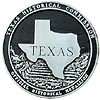| |
|
|
San Ygnacio |
|
 |
|
Laredo St, Washington Ave, San Ygnacio,
TX,
USA
Latitude & Longitude:
27° 2' 38.72315000004",
-99° 26' 26.1816"
|
| |
| |
|
Texas State
Historical Marker |
In the late 1820s, Jesús Treviño bought land and a hacienda from the heirs of José Vásquez Borrego. Treviño and his family, as well as several residents from nearby Revilla, Mexico (Guerrero), established a ranch and settlement and named it for Revilla's patron saint, San Ignacio de Loyola. In 1830, Treviño moved the ranch upriver, and for his headquarters he constructed a building of native sandstone. In 1851, his son-in-law, Blás María Uribe, had José Villarreal build and place a sundial on the entrance. Uribe later added other structures, forming the compound known today as Fort Treviño, or El Fuerte. Uribe also joined in discussions surrounding the formation of the Republic of the Río Grande. He and his brothers-in-law, Vicente Gutiérrez and Manuel Benavides García, were active leaders in San Ygnacio, which became a regional trade center, with access to land and river routes. In 1873, Uribe deeded land for Nuestra Señora del Refugio Catholic Church. Largely populated by farmers and laborers, and following many years as a duty-free border zone, San Ygnacio continued to prosper late into the 19th century. The settlement, bypassed by the railroad in the 1880s, remained viable through its farming and ranching enterprises. Throughout the years, the area was often involved in political and military operations. In the early 1950s, plans for Falcon Reservoir posed a threat to the historic townsite. A committee headed by Mercurio Martínez successfully petitioned government officials to spare the community. Despite flood damage incurred in 1954, San Ygnacio has remained intact. Today, it is a unique example of a mid-19th century Texas border town, with numerous native sandstone structures, and is considered the oldest inhabited settlement in Zapata County. (2005)
This page last updated: 7/15/2008 |
San Ygnacio Historical Marker Location Map, Texas
|
|
|
|


